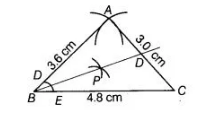Construct a triangle whose sides are 3.6 cm , 3.0 cm and 4. 8 cm. Bisect the smallest angle and .measure each part.
Thinking Process
Angle opposite to smallest side is smallest.
To construct a triangle $A B C$ in which $A B=3.6 \mathrm{~cm}, A C=3.0 \mathrm{~cm}$ and $B C=4.8 \mathrm{~cm}$, use the following steps.
1. Draw a line segment $B C$ of length $4.8 \mathrm{~cm}$.
2. From B, point A is at a distance of $3.6 \mathrm{~cm}$. So, having B as centre, draw an arc of radius $3.6 \mathrm{~cm}$.

3. From $\mathrm{C}$, point $\mathrm{A}$ is at a distance of $3 \mathrm{~cm}$. So, having $\mathrm{C}$ as centre, draw an arc of radius $3 \mathrm{~cm}$ which intersect previous arc at $\mathrm{A}$.
4. Join $A B$ and $A C$. Thus, $\triangle A B C$ is the required triangle.
Flere, angle B is smallest, as AC is the smallest side. To direct angle B, we use the following steps.
1. Taking B as centre, we draw an are intersecting AB and BC at D and E, respectively.
2. Taking $D$ and $E$ as centres we draw arcs intersecting at $P$.
3. Joining BP, we obtain angle bisector of $\angle B$.
4. Flere, $\angle A B C=39^{\circ}$
Thus, $\angle A B D=\angle D B C=1 / 2 \times 139^{\circ}=19.5^{\circ}$
